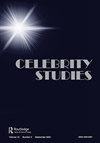Introduction
IF 0.6
3区 社会学
Q3 CULTURAL STUDIES
引用次数: 0
Abstract
On 26 November 2019, at the height of the bitterly fought General Election campaign which saw a landslide win for Boris Johnson’s Conservative Party, Hugh Grant tweeted: ‘Young people – today is your last chance. Register to vote or I will make another enchanting romantic comedy. #registertovote TACTICALLY’. (Grant 2019). The quip neatly encapsulates the actor’s career trajectory, and underlines some of the key tensions and facets within his star persona that have drawn our interest in this issue: the trademark selfdeprecation (with its strong connection to Englishness – more on this below), and the simultaneous disavowal and embracing of the genre he is most associated with in favour of a higher-brow political engagement. Like his romcom peer Matthew McConaughey, Grant had also very publicly moved away from the romantic comedy: his turn as a villainous washed-up actor in the box-office-hit Paddington 2 (2017) had sparked rumours of an Oscar campaign (Ehrlich 2018), and he had received significant plaudits for his role as disgraced politician Jeremy Thorpe in Russell T. Davies and Stephen Frears’s A Very English Scandal (2018), encompassing his first Emmy nomination and nods for the BAFTA TV, Golden Globes and Screen Actors Guild Awards. This pair of acclaimed performances was accompanied by an intense promotional campaign (e.g. his appearances on The Graham Norton Show 2017, Late Night with Seth Meyers 2018, The Late Show with Stephen Colbert 2018), in which Grant reinforced his ‘reluctant actor’ persona (York 2018), while also offering new insights into the relationship between his off-screen life and his newfound enjoyment of acting. The media attention only intensified when Grant interpreted the charmingly murderous Jonathan Fraser, opposite Nicole Kidman in HBO’s The Undoing (2020). Despite many reviewers remarking on the hammy plot, Grant’s villainous turn was widely praised, often seen as the main strength of the show (Baldwin 2020, Jones 2020, Tellerico 2020). With The Undoing, Grant replicated the nominations at the Emmy, Golden Globes and Screen Actors Guild Awards, amongst the others, although once again a win eluded him. Interest in Hugh Grant has by no means diminished since, as recently demonstrated by the rumours spread by the British tabloid Daily Mirror (Pryer 2022), quickly debunked by the actor via Twitter (Grant 2022), that he would have played the 14 incarnation of the titular character in a ‘Marvel-style’ revamp of Doctor Who. It was this career renaissance, and his increased political engagement, which sparked our interest in this Special Issue, as we first started to work on it in 2019. As his performances in Paddington 2 and A Very English Scandal started to garner plaudits, critics began to talk of a ‘Hugh Grant renaissance’ (a ‘Grantaissance’?), not dissimilar from the McConaissance (Syme 2016) that the other romcom leading man had experienced only a介绍
2019年11月26日,在鲍里斯·约翰逊领导的保守党以压倒性优势赢得大选的激烈竞选中,休·格兰特在推特上写道:“年轻人,今天是你们最后的机会。注册投票,否则我将制作另一部迷人的浪漫喜剧#注册投票策略”。(2019年拨款)。这句俏皮话巧妙地概括了这位演员的职业轨迹,并强调了他明星形象中引起我们对这一问题兴趣的一些关键紧张关系和方面:标志性的自嘲(与英语有着密切的联系——更多内容见下文),同时否认和接受他最相关的流派,支持更高雅的政治参与。和他的浪漫喜剧同行马修·麦康纳一样,格兰特也非常公开地离开了这部浪漫喜剧:他在票房大热的《帕丁顿2》(2017年)中饰演一名反派过气演员,引发了奥斯卡竞选的传言(埃利希,2018年),他因在《罗素T》中饰演名誉扫地的政治家杰里米·索普而获得了极大的赞誉。戴维斯和斯蒂芬·弗雷尔斯的《非常英国的丑闻》(2018),包括他首次获得艾美奖提名,并获得英国电影和电视艺术学院电视奖、金球奖和演员工会奖提名。这两次广受好评的表演伴随着一场激烈的宣传活动(例如,他在2017年《格雷厄姆·诺顿秀》、2018年《赛斯·迈耶斯深夜秀》和2018年《斯蒂芬·科尔伯特深夜秀》中的亮相),在这场活动中,格兰特强化了他“不情愿的演员”的形象(约克2018),同时也为他在银幕外的生活和他新获得的表演乐趣之间的关系提供了新的见解。当格兰特在HBO的《逍遥法外》(2020)中与妮可·基德曼(Nicole Kidman)演对手戏时,媒体的关注才加剧。尽管许多评论家对这部夸张的情节发表了评论,但格兰特的反派角色却广受好评,经常被视为该剧的主要优势(鲍德温2020、琼斯2020、泰勒里科2020)。凭借《逍遥法外》,格兰特获得了艾美奖、金球奖和演员工会奖等奖项的提名,尽管他再次未能获奖。正如英国小报《每日镜报》(Pryer 2022)最近散布的谣言所表明的那样,人们对休·格兰特的兴趣丝毫没有减弱,这位演员很快通过推特(Grant 2022)揭穿了这一谣言,即他将在《神秘博士》的“漫威风格”改造中扮演这个有名无实的角色的14个化身。正是这种职业复兴,以及他日益增加的政治参与,激发了我们对这期特刊的兴趣,因为我们在2019年首次开始撰写这期特辑。随着他在《帕丁顿2》和《非常英国的丑闻》中的表演开始赢得喝彩,评论家们开始谈论“休·格兰特的复兴”(“Grantaissance”
本文章由计算机程序翻译,如有差异,请以英文原文为准。
求助全文
约1分钟内获得全文
求助全文

 求助内容:
求助内容: 应助结果提醒方式:
应助结果提醒方式:


